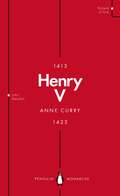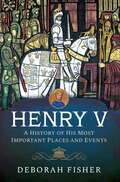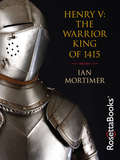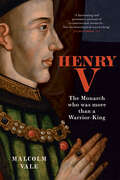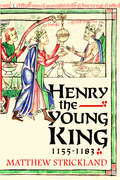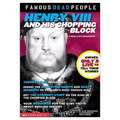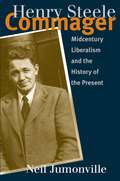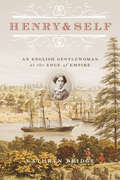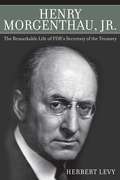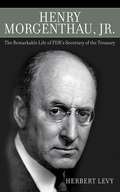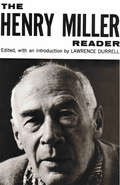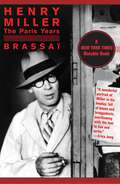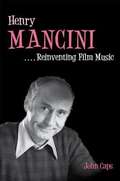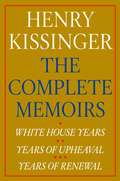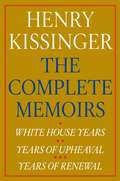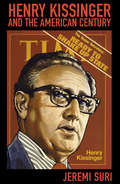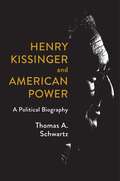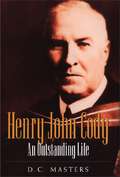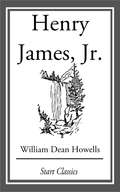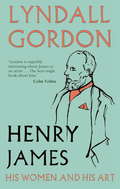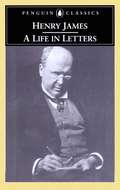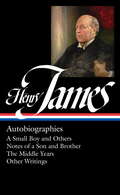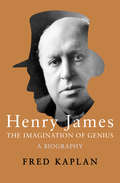- Table View
- List View
Henry V: From Playboy Prince to Warrior King (Penguin Monarchs)
by Anne CurryForemost medieval historian Anne Curry offers a new reinterpretation of Henry V and the battle that defined his kingship: AgincourtHenry V's invasion of France, in August 1415, represented a huge gamble. As heir to the throne, he had been a failure, cast into the political wilderness amid rumours that he planned to depose his father. Despite a complete change of character as king - founding monasteries, persecuting heretics, and enforcing the law to its extremes - little had gone right since. He was insecure in his kingdom, his reputation low. On the eve of his departure for France, he uncovered a plot by some of his closest associates to remove him from power. Agincourt was a battle that Henry should not have won - but he did, and the rest is history. Within five years, he was heir to the throne of France. In this vivid new interpretation, Anne Curry explores how Henry's hyperactive efforts to expunge his past failures, and his experience of crisis - which threatened to ruin everything he had struggled to achieve - defined his kingship, and how his astonishing success at Agincourt transformed his standing in the eyes of his contemporaries, and of all generations to come.
Henry V: A History of His Most Important Places and Events
by Deborah FisherThere are many books about King Henry V, several of which concentrate entirely on his victory at the Battle of Agincourt in 1415. This one looks at his life from a different point of view, concentrating on places that were important in his life and can still be visited by those interested in getting a better feel for the man and understanding how his character was shaped by his environment. Henry spent much of his youth on military campaigns in Ireland, Wales and the Marches. As Prince of Wales, he became battle-hardened as a teenager when he received a near-fatal wound at Shrewsbury. Despite a fraught relationship with his father, he quickly reinvented himself as a model king, and set his eyes firmly on the crown of France. Thereafter, much of his nine-year reign was spent on military campaigns beyond the British Isles. The book takes its reader on a journey from the rural areas around Monmouth, where he was born, to Harlech Castle, where he put an end to Owain Glyndwr's rebellion, and from his coronation at Westminster Abbey to his private retreat at Kenilworth. We see him seize Harfleur and take the long road to Calais, culminating in the Battle of Agincourt, one of the most spectacular victories ever won by an English army. We follow his continued campaigns in France, through his marriage to Catherine of Valois at Troyes, to his eventual, tragically premature, death at Vincennes.
Henry V: The Warrior King of 1415
by Ian MortimerFrom an award-winning historian: &“A new and convincing likeness of medieval England&’s most iconic king&” (The Sunday Times). This biography by the bestselling author of The Time Traveler&’s Guide to Medieval England takes an insightful look at the life of Henry V, casting new light on a period in history often held up as legend. A great English hero, Henry V was lionized by Shakespeare and revered by his countrymen for his religious commitment, his sense of justice, and his military victories. Here, noted historian and biographer Ian Mortimer takes a look at the man behind the legend and offers a clear, historically accurate, and realistic representation of a ruler who was all too human—and digs up fascinating details about Henry V&’s reign that have been lost to history, including the brutal strategies he adopted at the Battle of Agincourt. &“The most illuminating exploration of the reality of 15th-century life that I have ever read.&” —The Independent &“Compelling, exuberant . . . vivid.&” —Simon Sebag Montefiore, New York Times–bestselling author of The Romanovs: 1613–1918
Henry V: The Conscience of a King
by Mr Malcolm ValeFor curious readers young and old, a rich and colorful history of religion from humanity's earliest days to our own contentious times In an era of hardening religious attitudes and explosive religious violence, this book offers a welcome antidote. Richard Holloway retells the entire history of religion--from the dawn of religious belief to the twenty-first century--with deepest respect and a keen commitment to accuracy. Writing for those with faith and those without, and especially for young readers, he encourages curiosity and tolerance, accentuates nuance and mystery, and calmly restores a sense of the value of faith. Ranging far beyond the major world religions of Judaism, Islam, Christianity, Buddhism, and Hinduism, Holloway also examines where religious belief comes from, the search for meaning throughout history, today's fascinations with Scientology and creationism, religiously motivated violence, hostilities between religious people and secularists, and more. Holloway proves an empathic yet discerning guide to the enduring significance of faith and its power from ancient times to our own.
Henry the Young King, 1155-1183
by Matthew StricklandThis first modern study of Henry the Young King, eldest son of Henry II but the least known Plantagenet monarch, explores the brief but eventful life of the only English ruler after the Norman Conquest to be created co-ruler in his father's lifetime. Crowned at fifteen to secure an undisputed succession, Henry played a central role in the politics of Henry II's great empire and was hailed as the embodiment of chivalry. Yet, consistently denied direct rule, the Young King was provoked first into heading a major rebellion against his father, then to waging a bitter war against his brother Richard for control of Aquitaine, dying before reaching the age of thirty having never assumed actual power. In this remarkable history, Matthew Strickland provides a richly colored portrait of an all-but-forgotten royal figure tutored by Thomas Becket, trained in arms by the great knight William Marshal, and incited to rebellion by his mother Eleanor of Aquitaine, while using his career to explore the nature of kingship, succession, dynastic politics, and rebellion in twelfth-century England and France.
Henry the VIII and His Chopping Block
by Alan MacdonaldThis biography series is filled with humorous and gory details that children are not likely to learn in any history class. In this biography, readers learn all about the most famous of England's many kings, from the food that Henry VIII ate to his six wives.
Henry Steele Commager
by Neil JumonvilleHistorian Henry Steele Commager (1902-1998) was one of the leading American intellectuals of the mid-twentieth century. Author or editor of more than forty books, he taught for decades at New York University, Columbia University, and Amherst College and was a pioneer in the field of American studies. But Commager's work was by no means confined to the halls of the university: a popular essayist, lecturer, and political commentator, he earned a reputation as an activist for liberal causes and waged public campaigns against McCarthyism in the 1950s and the Vietnam War in the 1960s. As few have been able to do in the past half-century, Commager united the two worlds of scholarship and public intellectual activity. Through Commager's life and legacy, Neil Jumonville explores a number of questions central to the intellectual history of postwar America. After considering whether Commager and his associates were really the conservative and conformist group that critics have assumed them to be, Jumonville offers a reevaluation of the liberalism of the period. Finally, he uses Commager's example to ask whether intellectual life is truly compatible with scholarly life.
Henry & Self: An English Gentlewoman at the Edge of Empire
by Kathryn BridgeAn intimate portrait of privilege and struggle, scandal and accolade, from the Old World to the new colonies of Vancouver's Island and British Columbia.At the age of 33, Sarah Crease left her home in England to travel with her young family to a farflung outpost of the British Empire on the Pacific coast of North America. The detailed journals, letters and artwork she created over the next half century as she and her husband, Henry, established themselves in the New World offer a rich window into the private life and views of an English colonist in British Columbia.This is a woman's story in her own words. It is also a story of the times she lived in, and of how her class, social standing and role as a settler shaped her relationships with the world around her. Henry & Self is the personal account of a remarkable woman who lived through nearly a century of colonial history, but it is also a unique perspective on the beliefs and motivations that shaped that century.
Henry Morgenthau Jr.: The Remarkable Life of FDR's Secretary of the Treasury
by Herbert LevyA fascinating exploration of early to mid-twentieth-century politics as seen through the eyes of a Roosevelt technocrat. History seems to repeat itself. With ongoing wars abroad and the collapse of financial institutions at home, Americans rely on President Barack Obama and Secretary of the Treasury Jacob Lew to bring about positive change. When the US stock market collapsed in 1928 and World War II broke out, the nation turned to Franklin D. Roosevelt and his Secretary of the Treasury, Henry Morgenthau, Jr. , for leadership. Henry Morgenthau, Jr. explores the life of this native New Yorker. Born into a prominent Jewish family, Henry Morgenthau, Jr. , became a controversial figure in politics. Yet, his contributions were integral to social, political, and economic milestones in American history, all while he grappled with his identity as an American Jew during the atrocities of WWII in Europe. This new biography offers a glimpse of yesterday and lessons for today. Author Herbert Levy offers an extensively researched life of this important American leader. From thorough research in the archives of Hyde Park to careful study of Morgenthau’s letters, Levy delivers an in-depth account of the fascinating life of this remarkable man. This book explores the complex and oftentimes frustrating world in which Morgenthau was forced to live and illuminates his odyssey as a Roosevelt technocrat.
Henry Morgenthau, Jr.
by Herbert LevyHenry Morgenthau, Jr. was a young man living in an interesting political and social atmosphere. Surrounded by people who viewed the world through a Social Darwinist lens, and grappling with his identity as an American Jew during the atrocities of WWII in Europe, Henry Morgenthau, Jr. played an integral role as Roosevelt's secretary of the treasury during a tough economic and political time. Henry Morgenthau, Jr. explores the life of this native New Yorker, growing up in a business-minded family, spending most of his teenage years at boarding school, and feeling isolated from his peers. Morgenthau found true passion in farming, and it served him well during the years that FDR was governor of New York and again after Morgenthau's retirement from political life. Morgenthau established not only a working relationship with FDR during his presidency, but also a personal relationship, one that allowed him some freedom of expression in what he viewed as a sometimes intolerant era. Herbert Levy has done extensive research at the archives in Hyde Park to include many of Morgenthau's personal letters in this in-depth account of the man who crafted a controversial plan for the reconstitution of Germany. This book explores the complex and oftentimes frustrating world in which Morgenthau was forced to live and illuminates his odyssey as a Roosevelt technocrat.
The Henry Miller Reader (Essay Index Reprint Ser.)
by Henry Miller Lawrence DurrellA collection of works spanning the entire career of great 20th-century American writer Henry Miller, edited and introduced by Lawrence Durrell. In 1958, when Henry Miller was elected to membership in the American Institute of Arts and Letters, the citation described him as: "The veteran author of many books whose originality and richness of technique are matched by the variety and daring of his subject matter. His boldness of approach and intense curiosity concerning man and nature are unequalled in the prose literature of our times." It is most fitting that this anthology of "the best" of Henry Miller should have been assembled by one of the first among Miller’s contemporaries to recognize his genius, the eminent British writer Lawrence Durrell. Drawing material from a dozen different books Durrell has traced the main line and principal themes of the "single, endless autobiography" which is Henry Miller’s life work. "I suspect," writes Durrell in his Introduction, "that Miller’s final place will be among those towering anomalies of authorship like Whitman or Blake who have left us, not simply works of art, but a corpus of ideas which motivate and influence a whole cultural pattern." Earlier, H. L. Mencken had said, "his is one of the most beautiful prose styles today," and the late Sir Herbert Read had written that "what makes Miller distinctive among modern writers is his ability to combine, without confusion, the aesthetic and prophetic functions." Included are stories, "portraits" of persons and places, philosophical essays, and aphorisms. For each selection Miller himself prepared a brief commentary which fits the piece into its place in his life story. This framework is supplemented by a chronology from Miller’s birth in 1891 up to the spring of 1959, a bibliography, and, as an appendix, an open letter to the Supreme Court of Norway written in protest of the ban on Sexus, a part of which appears in this volume.
Henry Miller: The Paris Years
by Brassaï&“A wonderful portrait of Miller in his heyday: full of beans and braggadocio, overflowing with the lust to live and write.&”—Erica Jong His years in Paris were the making of Henry Miller. He arrived with no money, no fixed address, and no prospects. He left as the renowned if not notorious author of Tropic of Cancer and Tropic of Capricorn. Miller didn&’t just live in Paris—he devoured it. It was a world he shared with Brassaï, whose work, first collected in Paris by Night, established him as one of the greatest photographers of the twentieth century and the most exquisite and perceptive chronicler of Parisian vice. In Miller, Brassaï found his most compelling subject. Henry Miller: The Paris Years is an intimate account of a writer&’s self-discovery, seen through the unblinking eye of a master photographer. Brassaï delves into Miller&’s relationships with Anaïs Nin and Lawrence Durrell, as well as his hopelessly tangled though wildly inspiring marriage to June. He uncovers a side of the man scarcely known to the public, and through this careful portrait recreates a bright and swift-moving era. Most of all, Brassaï evokes their shared passion for the street life of the City of Light, captured in a dazzling moment of illumination.
Henry Mancini: Reinventing Film Music (Music in American Life)
by John CapsHenry Mancini, the first publicly successful and personally recognizable film composer in history, has practically become a Hollywood brand name. In his lifetime, he sold thirty million albums and won four Oscars and twenty Grammy awards. Through Mancini, mere background music in movies became part of pop culture--an expression of sophistication and wit with a modern sense of cool and a lasting lyricism that has not dated. The first comprehensive study of Mancini's music, Henry Mancini: Reinventing Film Music describes how the composer served as a bridge between the Big Band period of World War II and the impatient eclecticism of the Baby Boomer generation, between the grand formal orchestral film scores of the past and a modern American minimalist approach. Mancini's sound seemed to capture the bright, confident, welcoming voice of the middle class's new efficient life: interested in pop songs and jazz, in movies and television, in outreach politics but also conventional stay-at-home comforts. As John Caps shows, Mancini easily combined it all in his music. Mancini wrote his first dramatic music for a radio series in 1950. By the mid-1960s, he wielded influence in Hollywood and around the world with his iconic scores: dynamic jazz for the noirish detective TV show Peter Gunn, the sly theme from The Pink Panther, and his wistful folk song "Moon River" from Breakfast at Tiffany's. Following the evolution of Mancini's style, Caps traces the history of movie scoring in general: from the jazz-pop of the 1960s to the edgier, electro-funk harmonies of the Watergate 1970s, from the revisionist 1980s marked by New Age trends and new jazz chords to the frustrating New Hollywood of the 1990s when films were made by committees of lawyers rather than by artisans. Through insightful close readings of key films, Caps traces Mancini's collaborations with important directors and shows how he homed in on specific dramatic or comic aspects of each film to create musical effects through clever instrumentation, eloquent melodies, and the strong narrative qualities of his scores. Accessible and engaging, this fresh view of Mancini's oeuvre and influence will delight and inform fans of film and popular music.
Henry Knox
by Anita SilveyA hearty eater, dapper dresser, bookseller to Loyalists and Patriots alike,and married into a staunch Loyalist family, Henry Knox may seem an unlikely hero. But his fascination with warfare and strategy and his support of the Patriot cause prepared him to do what no one else thought was possible: transport heavy artillery from Fort Ticonderoga, up and down snow-covered hills and across frozen lakes, to relieve the siege of Boston. The dramatic story of his achievements is all the more satisfying for being absolutely true, a little-known episode in the history of the American Revolution. Source notes, time line, bibliography, map.
Henry Kissinger The Complete Memoirs eBook Boxed Set: White House Years; Years of Upheaval; Years of Renewal
by Henry KissingerA Simon & Schuster eBook. Simon & Schuster has a great book for every reader.
Henry Kissinger The Complete Memoirs eBook Boxed Set
by Henry KissingerThis e-book box set includes the complete memoirs of Henry Kissinger, detailing his life and work.<P> White House Years: One of the most important books to come out of the Nixon Administration, White House Years covers Henry Kissinger’s first four years (1969–1973) as Assistant to the President for National Security Affairs.<P> Years of Upheaval: This second volume of Henry Kissinger’s monumental memoirs covers his years as President Richard Nixon’s Secretary of State (1972–1974), including the ending of the Vietnam War, the 1973 Middle East War and oil embargo, Watergate, and Nixon’s resignation. Years of Upheaval opens with Dr. Kissinger being appointed Secretary of State.<P> Years of Renewal: This third and final volume of memoirs completes a major work of contemporary history. The third & final volume begins with the resignation of Nixon and takes the reader through the years of Ford's administration, in which Kissinger continued to play a decisive role. Years of Renewal is the triumphant conclusion of a major achievement and a book that will stand the test of time as a historical document of the first rank.
Henry Kissinger The Complete Memoirs E-book Boxed Set
by Henry KissingerThis e-book box set includes the complete memoirs of Henry Kissinger, detailing his life and work.White House Years: One of the most important books to come out of the Nixon Administration, White House Years covers Henry Kissinger's first four years (1969-1973) as Assistant to the President for National Security Affairs.Years of Upheaval: This second volume of Henry Kissinger's monumental memoirs covers his years as President Richard Nixon's Secretary of State (1972-1974), including the ending of the Vietnam War, the 1973 Middle East War and oil embargo, Watergate, and Nixon's resignation. Years of Upheaval opens with Dr. Kissinger being appointed Secretary of State.Years of Renewal: This third and final volume of memoirs completes a major work of contemporary history. The third & final volume begins with the resignation of Nixon and takes the reader through the years of Ford's administration, in which Kissinger continued to play a decisive role. Years of Renewal is the triumphant conclusion of a major achievement and a book that will stand the test of time as a historical document of the first rank.
Henry Kissinger and the American Century: Global Revolution And The Rise Of Detente
by Jeremi SuriWhat made Henry Kissinger the kind of diplomat he was? What experiences and influences shaped his worldview and provided the framework for his approach to international relations? Jeremi Suri offers a thought-provoking, interpretive study of one of the most influential and controversial political figures of the twentieth century. Drawing on research in more than six countries in addition to extensive interviews with Kissinger and others, Suri analyzes the sources of Kissinger's ideas and power and explains why he pursued the policies he did. Kissinger's German-Jewish background, fears of democratic weakness, belief in the primacy of the relationship between the United States and Europe, and faith in the indispensable role America plays in the world shaped his career and his foreign policy. Suri shows how Kissinger's early years in Weimar and Nazi Germany, his experiences in the U. S. Army and at Harvard University, and his relationships with powerful patrons--including Nelson Rockefeller and Richard Nixon--shed new light on the policymaker. Kissinger's career was a product of the global changes that made the American Century. He remains influential because his ideas are rooted so deeply in dominant assumptions about the world. In treating Kissinger fairly and critically as a historical figure, without polemical judgments, Suri provides critical context for this important figure. He illuminates the legacies of Kissinger's policies for the United States in the twenty-first century.
Henry Kissinger and American Power: A Political Biography
by Thomas A. Schwartz[Henry Kissinger and American Power] effectively separates the man from the myths." —The Christian Science Monitor | Best books of August 2020The definitive biography of Henry Kissinger—at least for those who neither revere nor revile himOver the past six decades, Henry Kissinger has been America’s most consistently praised—and reviled—public figure. He was hailed as a “miracle worker” for his peacemaking in the Middle East, pursuit of détente with the Soviet Union, negotiation of an end to the Vietnam War, and secret plan to open the United States to China. He was assailed from the left and from the right for his indifference to human rights, complicity in the pointless sacrifice of American and Vietnamese lives, and reliance on deception and intrigue. Was he a brilliant master strategist—“the 20th century’s greatest 19th century statesman”—or a cold-blooded monster who eroded America’s moral standing for the sake of self-promotion?In this masterfully researched biography, the renowned diplomatic historian Thomas Schwartz offers an authoritative, and fair-minded, answer to this question. While other biographers have engaged in hagiography or demonology, Schwartz takes a measured view of his subject. He recognizes Kissinger’s successes and acknowledges that Kissinger thought seriously and with great insight about the foreign policy issues of his time, while also recognizing his failures, his penchant for backbiting, and his reliance on ingratiating and fawning praise of the president as a source of power. Throughout, Schwartz stresses Kissinger’s artful invention of himself as a celebrity diplomat and his domination of the medium of television news. He also notes Kissinger’s sensitivity to domestic and partisan politics, complicating—and undermining—the image of the far-seeing statesman who stands above the squabbles of popular strife. Rounded and textured, and rich with new insights into key dilemmas of American power, Henry Kissinger and American Power stands as an essential guide to a man whose legacy is as complex as the last sixty years of US history itself.
Henry John Cody: An Outstanding Life
by Donald Campbell MastersHenry John Cody was born in Embro, Ontario, on December 6, 1868. He was a great man in his day, in Toronto especially, in the Anglican church, in educational circles (both in school and university), and in the Conservative Party, but now, some forty years after his death, he is almost forgotten and indeed unheard of by anyone under 50.
Henry James, Jr.
by William Dean HowellsWilliam Dean Howells (1837-1920) was an American realist author and literary critic. He wrote his first novel, Their Wedding Journey, in 1871, but his literary reputation really took off with the realist novel A Modern Instance, published in 1882, which describes the decay of a marriage. His 1885 novel The Rise of Silas Lapham is perhaps his best known, describing the rise and fall of an American entrepreneur in the paint business. His social views were also strongly reflected in the novels Annie Kilburn (1888) and A Hazard of New Fortunes (1890). While known primarily as a novelist, his short story "Editha" (1905) - included in the collection Between the Dark and the Daylight (1907) - appears in many anthologies of American literature. Howells also wrote plays, criticism, and essays about contemporary literary figures such as Ibsen, Zola, Verga, and, especially, Tolstoy, which helped establish their reputations in the United States. He also wrote critically in support of many American writers. It is perhaps in this role that he had his greatest influence.
Henry James: His Women and His Art
by Lyndall GordonJames's friendship with Constance Fenimore Woolson ended in 1894 when he tried to drown a boatload of her dresses in the Venetian lagoon; she had fallen to her death three months before. It was an elusive friendship that echoed his mysterious relationship with Minny Temple who had died twenty years earlier. From their graves, these two women haunted his imagination and his fiction, inspiring the creation of his heroines.
Henry James: A Life in Letters
by James HenryJames's correspondents included presidents and prime ministers, painters and great ladies, actresses and bishops, and the writers Robert Louis Stevenson, H.G. Wells and Edith Wharton. This fully-annotated selection from James's eloquent correspondence allows the writer to reveal himself and the fascinating world in which he lived. The letters provide a rich and fascinating source for James' views on his own works, on the literary craft, on sex, politics and friendship. Together they constitute, in Philip Horne's own words, James' 'real and best biography'.
Henry James: A Small Boy and Others / Notes of a Son and Brother / The Middle Years / Other Writings
by Henry James Philip HorneThe most extensive collection of Henry James's autobiographical writings ever published offers a revelatory self-portrait from one of America's supreme novelists and his famous family. In 1911, deeply affected by the death of his brother William the year before, Henry James began working on a book about his early life. As was customary for James in his later years, he dictated his recollections to his secretary Theodora Bosanquet, who recalled how "a straight dive into the past brought to the surface treasure after treasure." A Small Boy and Others (1913) and the two autobiographical books that followed--Notes of a Son and Brother (1914) and the incomplete, posthumously published The Middle Years--stand with his later novels as one of the enduring triumphs of his final years. Not only did James create one of the singular self-portraits in American literature, he also fashioned a richly detailed account of his renowned family, especially his father, the social philosopher Henry James Sr., his brother William, and his dear cousin Minny Temple, inspiration for the heroines of two of his greatest novels, The Portrait of a Lady and The Wings of the Dove.Rounding out the volume is a selection of eight other personal reminiscences and, as an appendix, his secretary's insightful and affectionate memoir, "Henry James at Work."From the Hardcover edition.
Henry James: The Imagination of Genius, A Biography
by Fred KaplanA stunning biography of the magisterial author behind The Portrait of a Lady and The AmbassadorsHenry James is an absorbing portrait of one of the most complex and influential nineteenth-century American writers. Fred Kaplan examines James&’s brilliant and troubled family—from his brother, a famous psychologist, to his sister, who fought with mental illness—and charts its influence on the development of the artist and his work. The biography includes a fascinating account of James&’s life as an American expatriate in Europe, and his friendships with Edith Wharton and Joseph Conrad. Compressing a wealth of research into one engrossing and richly detailed volume, Henry James is a compelling exploration of its subject.
